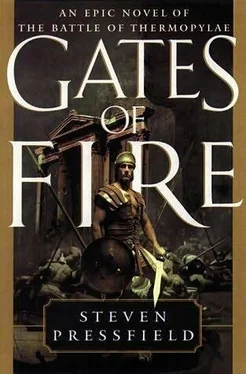Steven Pressfield - Gates of Fire - An Epic Novel of the Battle of Thermopylae
Здесь есть возможность читать онлайн «Steven Pressfield - Gates of Fire - An Epic Novel of the Battle of Thermopylae» весь текст электронной книги совершенно бесплатно (целиком полную версию без сокращений). В некоторых случаях можно слушать аудио, скачать через торрент в формате fb2 и присутствует краткое содержание. Жанр: Историческая проза, на английском языке. Описание произведения, (предисловие) а так же отзывы посетителей доступны на портале библиотеки ЛибКат.
- Название:Gates of Fire: An Epic Novel of the Battle of Thermopylae
- Автор:
- Жанр:
- Год:неизвестен
- ISBN:нет данных
- Рейтинг книги:3 / 5. Голосов: 1
-
Избранное:Добавить в избранное
- Отзывы:
-
Ваша оценка:
- 60
- 1
- 2
- 3
- 4
- 5
Gates of Fire: An Epic Novel of the Battle of Thermopylae: краткое содержание, описание и аннотация
Предлагаем к чтению аннотацию, описание, краткое содержание или предисловие (зависит от того, что написал сам автор книги «Gates of Fire: An Epic Novel of the Battle of Thermopylae»). Если вы не нашли необходимую информацию о книге — напишите в комментариях, мы постараемся отыскать её.
Gates of Fire: An Epic Novel of the Battle of Thermopylae — читать онлайн бесплатно полную книгу (весь текст) целиком
Ниже представлен текст книги, разбитый по страницам. Система сохранения места последней прочитанной страницы, позволяет с удобством читать онлайн бесплатно книгу «Gates of Fire: An Epic Novel of the Battle of Thermopylae», без необходимости каждый раз заново искать на чём Вы остановились. Поставьте закладку, и сможете в любой момент перейти на страницу, на которой закончили чтение.
Интервал:
Закладка:
I won't, lord.
Dienekes studied him a long, hard moment. Shut up and get the fuck out of here.
Rooster took off after the formation at a run. I confess I was ill with envy. The first squire of a Peer, and not just that, but a polemarch and king's tent companion. I hated Rooster for his dumb blind luck.
Or was it? As I blanched, numb with jealousy, a picture of the lady Arete shot across the eye of my mind. She was behind this. I felt even worse and regretted bitterly that I had confided to her my vision of Apollo Far Striker.
Let me see your back, Dienekes commanded. I turned again; he whistled appreciatively. By God, if there were an Olympic event in back-striping, you'd be the betting man's favorite. He had me face about and stand at attention before him; he regarded me thoughtfully, his gaze seeming to pierce straight through to my spine. The qualities of a good battle squire are simple enough. He must be dumb as a mule, numb as a post and obedient as an imbecile. In these qualifications, Xeones of Astakos, I declare your credentials impeccable.
Suicide was chuckling darkly. He tugged something from behind the quiver at his back. Go ahead, take a look, Dienekes ordered. I raised my eyes.
In the Scythian's hand stood a bow. My bow.
Dienekes commanded me to take it.
You're not strong enough yet to be my first squire, but if you can manage to keep your head out of your ass, you might make a half-respectable second. Into my palm Suicide placed the bow, the big Thessalian cavalry weapon that had been confiscated from me at twelve, when first I crossed the frontier into Lakedaemon.
I could not stop my hands from trembling; I felt the warm ash of the bow and the living current that coursed its length and up into my palms.
You'll pack my rations, bedding and medical kit, Dienekes instructed me. You'll cook for the other squires and hunt for my pot, on exercises in Lakedaemon and beyond the border on campaign. Do you accept this?
I do, lord.
At home you may hunt hares and keep them for yourself, but don't flaunt your good fortune.
I won't, lord.
He regarded me with that look of wry amusement I had observed on his face before, at a distance, and which I would come to see many times more close-up.
Who knows, my new master said, with luck, you might even get in a potshot at the enemy.
Book Four. Arete
Chapter Fifteen
The army of Lakedaemon marched out in twenty-one dif-ferent campaigns over the next five years, all in actions against other Hellenes. That pitch of enmity which Leonidas had sought since Antirhion to maintain focused upon the Persian now found itself of necessity directed against more immediate targets, those cities of Greece which tilted perfidiously toward playing the traitor, allying themselves in advance with the invader, to save their own skins.
Mighty Thebes, whose exiled aristocrats conspired ceaselessly with the Persian court, seeking to reclaim preeminence in their country by selling it out to the foe.
Jealous Argos, Sparta 's most bitter and proximate rival, whose nobles treated openly with the agents of the Empire. Macedonia under Alexander had long since offered tokens of submission.
Athens, too, had exiled aristocrats reclining within the Persian pavilions while they plotted for their own restoration as lords beneath the Persian pennant.
Sparta herself stood not immune from treason, for her deposed king, Demaratos, as well had taken up the exile's station among the sycophants surrounding His Majesty. What else could Demaratos' desire be, save reaccession to power in Lakedaemon as satrap and magistrate of the Lord of the East?
In the third year after Antirhion, Darius of Persia died.
When news of this reached Greece, hope rekindled in the free cities. Perhaps now the Persian would abort his mobilization. With her King dead, would not the army of the Empire disband?
Would not the Persian vow to conquer Hellas be set aside?
Then you, Your Majesty, acceded to the throne.
The army of the foe did not disband.
Her fleet did not disperse.
Instead the Empire's mobilization redoubled. The zeal of a prince freshly crowned burned within His Majesty's breast. Xerxes son of Darius would not be judged by history inferior to his father, nor to his illustrious forebears Cambyses and Cyrus the Great. These, who had vanquished and enslaved all Asia, would be joined in the pantheon of glory by Xerxes, their scion, who would now add Greece and Europe to the roll of provinces of the Empire.
Across all Hellas, phobos advanced like a sapper's tunnel. One smelled the dust of its excavation in the still of morning and felt its yard-by-yard advance rumbling beneath one in his sleep. Of all the mighty cities of Greece, only Sparta, Athens and Corinth held fast. These dispatched legation after legation to the wavering poleis, seeking to bind them to the Alliance. My own master was assigned in a single season to five separate overseas embassies. I puked over so many different ships' rails I couldn't recall one from the other.
Everywhere these embassies touched, phobos had called first. The Fear made people reckless.
Many were selling all they owned; others, more heedless, were buying. Let Xerxes spare his sword and send his purse instead, my master observed in disgust after yet another embassy had been rebuffed. The Greeks will trample one another's bones, racing to see who first can sell his freedom.
Always upon these legations, a part of my mind kept alert for word of my cousin. Three times in my seventeenth year the service of my master brought me through the city of the Athenians; each time I inquired after the location of the home of the gentlewoman whom Diomache and I had encountered that morning on the road to the Three Comers, when that fine lady had ordered Dio to seek her town estate and take service there. I secured at last the quarter and street but never succeeded in finding the house.
Once at a salon in the Athenian Akademe a lovely bride of twenty appeared, mistress of the household, and for a moment I was certain it was Diomache. My heart began to pound so violently that I must kneel upon one knee for fear of dropping to the floor dead faint. But the lady was not she. Nor was the bride glimpsed a year later bearing water from a spring in Naxos. Nor the physician's wife encountered under cloister in Histiaea six months thereafter.
Upon one blistering summer evening, two years before the battle at the Gates, the ship bearing my master's legation touched briefly at Phaleron, a port of Athens. Our mission completed, we had two hours before tide's turn. I was granted leave and on the run at last located the house of the family of the lady of the Three Corners. The place was shuttered; phobos had driven the clan forth to landholdings in Iapygia, or so I was informed by a loitering squad of Scythian archers, those thugs whom the Athenians employ as city constabulary. Yes, the brutes remembered Diomache. Who could forget her? They took me for another of her suitors and spoke in the crude language of the street.
The bird winged off, one said. Too wild for the cage.
Another declared he had encountered her since, in the market with a husband, a citizen and sea officer. The fool bitch, he laughed. To knot with that salt-sucker, when she could have had me!
Returning to Lakedaemon, I resolved to root this folly of longing from my heart, as a farmer bums out a stubborn stump. I told Rooster it was time I took a bride. He found one for me, his cousin Thereia, the daughter of his mother's sister. I was eighteen, she fifteen when we were joined in the Messenian fashion practiced by the helots. She bore a son within ten months and a daughter while I was away on campaign.
A husband now, I vowed to think no more of my cousin. I would eradicate my own impiety and dwell no longer upon fancies.
Читать дальшеИнтервал:
Закладка:
Похожие книги на «Gates of Fire: An Epic Novel of the Battle of Thermopylae»
Представляем Вашему вниманию похожие книги на «Gates of Fire: An Epic Novel of the Battle of Thermopylae» списком для выбора. Мы отобрали схожую по названию и смыслу литературу в надежде предоставить читателям больше вариантов отыскать новые, интересные, ещё непрочитанные произведения.
Обсуждение, отзывы о книге «Gates of Fire: An Epic Novel of the Battle of Thermopylae» и просто собственные мнения читателей. Оставьте ваши комментарии, напишите, что Вы думаете о произведении, его смысле или главных героях. Укажите что конкретно понравилось, а что нет, и почему Вы так считаете.












